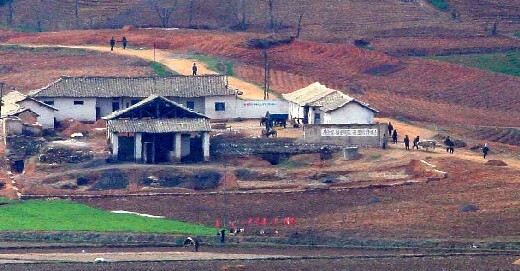hankyoreh
Links to other country sites 다른 나라 사이트 링크
[Analysis] North Korea’s April 21 communications test the South Korean government

Following South Korea’s official meeting with North Korea in North Korea’s border city of Kaesong (Gaeseong), the first in more than a year, the South Korean government has mobilized its officials in the fields of diplomacy and security to map out how to proceed in negotiations with North Korea. In particular, officials at the Ministry of Unification and the third division in charge of North Korea at the National Intelligence Service were in full gear. The officials had been shunned since the South Korean government of President Lee Myung-bak was inaugurated.
In a meeting with chief presidential aides on April 22, President Lee was briefed on the “April 21” inter-Korea meeting of officials. Afterwards, Lee asked aides to “make full preparations to cope with future negotiations.” On the previous night, shortly after South Korea and North Korea had concluded the meeting, Lee convened security-related ministers together and ordered them to “readjust the timing of the announcement to fully participate in the Proliferation Security Initiative and take into consideration future South-North negotiations.” The South Korean government plans to confirm its position on PSI and also propose another meeting with North Korea after analyzing the contents of the Kaesong meeting.
In a meeting later that day of the National Assembly’s Committee for Reunification, Diplomacy and Foreign Trade, Unification Minister Hyun In-taek said they “will carefully analyze North Korea’s communications by gathering opinions from Hyundai Asan and companies at the Kaesong industrial complex.”
At the Kaesong meeting, North Korea had demanded South Korea raise wages for North Korean workers at the Kaesong complex and revise its contract with Hyundai Asan and Korea Land Corp. on land rental terms. In addition, North Korea called for changes to an earlier agreement under which South Korean firms operating at Kaesong are allowed to use land in Kaesong free of charge. North Korea wants to shorten the period of the lease by four years.
Some analysts are suggesting that the South Korean government is placing an emphasis on efforts to gather opinions from firms about these new demands as perhaps contract negotiations may pave the way for Seoul and Pyongyang to resume official inter-Korea talks. An official at the Ministry of Unification said, “North Korea’s move to renegotiate or scrap existing contracts signals both applies pressure against the Kaesong Industrial Complex project and for makes possible talks with South Korea. South Korea needs to respond with sincerity and make this happen.”
It is difficult to predict, however, whether more meetings with North Korea would lead to practical dialogue between the two authorities. Former unification minister Cheong Se-hyeon says, “Although the government wants to make this about talks between authorities from South Korea and North Korea, as the contracts are between Hyundai Asan, Korea Land Corp. and North Korea, the two companies should take the lead.” Lee Bong-jo, a former vice unification minister, says even if another meeting of authorities from South Korea and North Korea were held, such a meeting may “result in a situation where North Korea unilaterally delivers its demands, rather than engages in a practical dialogue.”
Nevertheless, North Korea’s communications test the South Korean government because it is the first step made towards inter-Korean dialogue since President Lee has taken office. As the government leans towards a dialogue with North Korea, the mood at the Ministry of Foreign Affairs and Trade, which leads a hard line policy against North Korea and supports a decision for South Korea to become a full participating member of PSI, was subdued. However, given uneven sentiments articulated within Lee’s administration on dialogue with North Korea, any unexpected issue that arises during the process of negotiating with North Korea could change the mood. Accordingly, some government officials point to the fact that, “There is the need for a certain level of support from the President.”
Please direct questions or comments to [englishhani@hani.co.kr]
Editorial・opinion
![[Column] Is Korean democracy really regressing? [Column] Is Korean democracy really regressing?](https://flexible.img.hani.co.kr/flexible/normal/500/300/imgdb/original/2024/0705/2917201664129137.jpg) [Column] Is Korean democracy really regressing?
[Column] Is Korean democracy really regressing?![[Column] How tragedy pervades weak links in Korean labor [Column] How tragedy pervades weak links in Korean labor](https://flexible.img.hani.co.kr/flexible/normal/500/300/imgdb/original/2024/0703/8717199957128458.jpg) [Column] How tragedy pervades weak links in Korean labor
[Column] How tragedy pervades weak links in Korean labor- [Column] How opposing war became a far-right policy
- [Editorial] Korea needs to adjust diplomatic course in preparation for a Trump comeback
- [Editorial] Silence won’t save Yoon
- [Column] The miscalculations that started the Korean War mustn’t be repeated
- [Correspondent’s column] China-Europe relations tested once more by EV war
- [Correspondent’s column] Who really created the new ‘axis of evil’?
- [Editorial] Exploiting foreign domestic workers won’t solve Korea’s birth rate problem
- [Column] Kim and Putin’s new world order
Most viewed articles
- 110 days of torture: Korean mental patient’s restraints only removed after death
- 2Months after outcry over “torture devices,” Justice Ministry proposes more restraints for immigratio
- 3[Column] Is Korean democracy really regressing?
- 4Former bodyguard’s dark tale of marriage to Samsung royalty
- 5Beleaguered economy could stymie Japan’s efforts to buoy the yen
- 6Real-life heroes of “A Taxi Driver” pass away without having reunited
- 7[Editorial] Exploiting foreign domestic workers won’t solve Korea’s birth rate problem
- 8[Column] How tragedy pervades weak links in Korean labor
- 9Koreans are getting taller, but half of Korean men are now considered obese
- 10Democrats ride wave of 1M signature petition for Yoon to be impeached